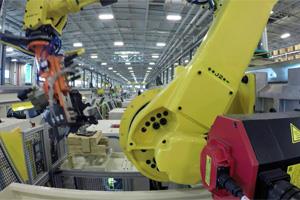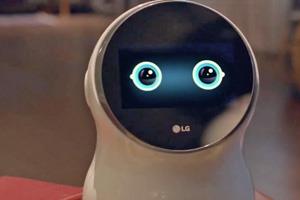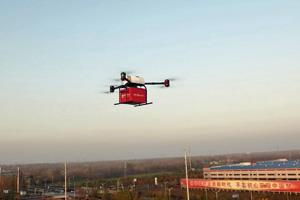
Artificial intelligence has yet to find a way to tell you a good TV show from bad.
Yes, if you're familiar with the streaming services — or Amazon's online store, for that matter — you'll get an endless stream of prompts, telling you, "If you liked that, you might like this," but it's not the same. Hank is not Frasier, even though to AI, it must be because it's a one-man sitcom starring the same actor.
And that's a problem, according to this week's PBS Frontline program In the Age of AI (Tuesday at 9 p.m. ET, check local listings). It's one thing to get a TV show wrong, but it's quite another to get the future of work, corporate surveillance, facial recognition, and the threat to democracy wrong, especially in the febrile times in which we live. The race to be the first global AI superpower is on, and this time there's no guarantee Silicon Valley will come out on top. China is the new Saudi Arabia, Frontline tells us, and we ignore that to our peril.
 In the Age of AI is two hours, longer than Frontline's usual hour, and it bears many of the signatures of the program's more ambitious efforts. It's informative and eye-opening in parts, and disturbing in others. The subject is vast, however, and as with many Frontline programs of this type, the focus wanders from time to time. When new technology is as all-seeing and potentially invasive as AI is, it can potentially affect every aspect of your life; from the moment your body clock tells you when to get up in the morning to deciding whether you'll get that new job or not before you even apply.
In the Age of AI is two hours, longer than Frontline's usual hour, and it bears many of the signatures of the program's more ambitious efforts. It's informative and eye-opening in parts, and disturbing in others. The subject is vast, however, and as with many Frontline programs of this type, the focus wanders from time to time. When new technology is as all-seeing and potentially invasive as AI is, it can potentially affect every aspect of your life; from the moment your body clock tells you when to get up in the morning to deciding whether you'll get that new job or not before you even apply.
Politics — state interference in other people's elections — is the hot-button issue of the day, but it's not the only one.
Some of this is obvious. The nightly news is full of stories about cases of mistaken identity based on facial recognition or a delivery package delivered to the wrong address, with unintended consequences, but it's the larger, potentially life-changing aspects of AI that slip by, unmentioned.
Few people, for example, realize that long-haul truck-driving jobs — the lifeline of the nation's transportation industry — could vanish within the next 10-20 years, as AI takes over. Trucks driven by remote control AI are more efficient, less expensive, more reliable, and don't complain as much as human drivers.
The bigger question, for society and for the democracy — what are all those drivers going to do once their skills are no longer needed: how are they going to earn a living for their families and what is that likely to do to the social and political fabric — is going unanswered. In fact, as In the Age of AI points out, it's not even being asked.
 In the Age of AI was written and directed by Frontline veterans Neil Docherty and David Fanning, the program's longtime executive producer, and it's broken into five separate stories. That's a savvy way of getting a seemingly unruly subject under control, but the hard truth is that it's impossible to cover all the bases in just two hours when the topic covers everything from commercial implications to how we live our daily lives.
In the Age of AI was written and directed by Frontline veterans Neil Docherty and David Fanning, the program's longtime executive producer, and it's broken into five separate stories. That's a savvy way of getting a seemingly unruly subject under control, but the hard truth is that it's impossible to cover all the bases in just two hours when the topic covers everything from commercial implications to how we live our daily lives.
In the Age of AI begins by showing how AI can now routinely beat humans at mind games like chess and Jeopardy! And video games that demand split-second decision-making and swift hand-to-eye coordination. Artificial intelligence has evolved to the point where it can predict an outcome — just one step shy of human thought — but, as Docherty and Fanning warn, emotional intelligence is still a long way away.
More importantly, Frontline asks us whether we even want AI to develop emotional intelligence, to become more human, not for our collective ego's sake but for its more serious implications — the inability to realize, for example, when it's made a mistake. The Boeing 737-800 Max experienced two deadly crashes, for example, killing all aboard in both cases, because the cockpit AI overruled the frantic efforts of pilots to correct what, to them, was a clear and obvious error. Airline pilots today are paid a lot of money for that precise purpose. We're getting to a point where nearly all commercial airliners can fly without a pilot at all in many cases, but the pilot is there in case of an emergency when every single aspect of that pilot's experience, training and flying hours will be called into question. (Another little-known fact: Flight attendants are much the same. They're not really there to serve you drinks; their primary job, which goes largely unrecognized, is to help passengers off the plane in the event of a forced landing. They're safety professionals first and hospitality workers second. If it weren't for TV newsmagazines like Frontline, hardly anyone would know that.)
The first of In the Age of AI's five stories, titled "China has a Plan," is self-explanatory.
The age of AI will usher in a new age of prosperity, but it will also deepen inequality, challenge democracy, and potentially divide the world into two AI superpowers. The first of In the Age of AI's five stories, titled China has a Plan, is self-explanatory. Some cars are already driving themselves in Beijing — the inevitability of "autonomous vehicles," as they're called. There are problems, but Chinese engineers are playing the long game. The experts in China who speak with Frontline are candid and honest in their assessment of where things stand at this exact moment in time: US technology is ahead, for the moment, but China has the larger market and, just as critically, the unswerving focus and attention of its national government: China's leaders are taking this seriously, and are dedicating all the resources at their disposal to making sure their version of AI comes out on top.
 Left unspoken is the US government's apparent attitude of boasting and empty bluster — not just suspicious of science but anti-science in some cases.
Left unspoken is the US government's apparent attitude of boasting and empty bluster — not just suspicious of science but anti-science in some cases.
"One of the things I worry about most," Wired magazine editor-in-chief Nicholas Thompson says," is that the world is going to split in two, and that there'll be a Chinese tech sector and an American tech sector. And countries will effectively get to choose which one they want. It'll be kind of like the Cold War, where you decide, are we going to align with the Soviet Union or are we going to align with the United States? That's not a world that's good for anybody."
Does any of this matter?
Consider what the national news will be focusing on for the next year, virtually to the day.
The "digital exhaust" from our day-to-day lives, the data that Google, Facebook, Instagram and Twitter collect about our daily habits and beliefs — "The Story of Us" — pervading every element of our daily lives, can be used by third parties to identify and focus on potential backers of their cause, whatever that cause might be.
"This is precisely what Cambridge Analytica did," Shoshana Zuboff, Harvard professor emerita and author of The Age of Surveillance Capitalism, tells Frontline. "(They) simply pivoted from advertisers to political outcomes.
"We came into this world thinking we were users of social media. It didn't occur to us that social media was actually using us.
"We thought that we were searching Google. We had no idea that Google was searching us."